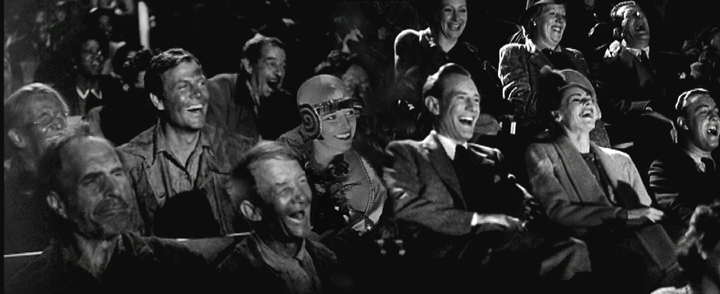In today’s Wall Street Journal “Sightings” column I expand on a notion that’s been much on my mind in recent years, my growing belief that comedy is truer to life than tragedy. Here’s an excerpt.
* * *
Of all the great tragedies, Shakespeare’s “King Lear” seems to me to be the very greatest. I went to a very fine production of “Lear” the other day, and was impressed all over again by the play’s incomparable richness and beauty. Yet all things being equal, I’d almost always choose to see a comedy like “Twelfth Night” or “Much Ado About Nothing” instead. It’s not that I don’t love “Lear.” I do, passionately. But as I grow older, I grow more firmly convinced that comedy is truer to life than tragedy, not just onstage but in all the narrative art forms.
 This isn’t to say that the tragic vision of life is false. I’ve sat through more than enough funerals to have figured that out….But I’ve spent enough time chuckling at the unintended absurdities of those very same funerals to know that in most human lives, absurdity and sorrow are woven together too tightly to be teased apart–and it is comedy, not tragedy, which illustrates that fact most fully. Life is too complex to be painted solely in shades of black. Even Shakespeare made room in “Lear” for the Fool, who makes us all laugh by saying out loud what poor old King Lear fears in his heart of hearts–that he, too, has been a fool, and will shortly pay the ultimate price for his foolishness….
This isn’t to say that the tragic vision of life is false. I’ve sat through more than enough funerals to have figured that out….But I’ve spent enough time chuckling at the unintended absurdities of those very same funerals to know that in most human lives, absurdity and sorrow are woven together too tightly to be teased apart–and it is comedy, not tragedy, which illustrates that fact most fully. Life is too complex to be painted solely in shades of black. Even Shakespeare made room in “Lear” for the Fool, who makes us all laugh by saying out loud what poor old King Lear fears in his heart of hearts–that he, too, has been a fool, and will shortly pay the ultimate price for his foolishness….
Yes, “King Lear” is charged with universal feelings–but it isn’t real. Not only is it set in a far-off fairyland of kings and queens, but it ends, like most of Shakespeare’s tragedies, with a mile-high stack of corpses, a horrific spectacle which precious few of us have had the misfortune to behold.
Because Shakespeare was a genius, he was capable of making us sympathize with Lear and his regal travails. If, on the other hand, the hapless hero of a comedy should trip over a rake, fracture his pelvis and bring the house down, we don’t have any trouble identifying with his preposterous plight. We’ve all been there, more or less….
* * *
Read the whole thing here.
An excerpt from the 1983 TV version of King Lear, starring Laurence Olivier as Lear, John Hurt as the Fool, and Diana Rigg as Regan:
Terry Teachout on the arts in New York City
An ArtsJournal Blog
